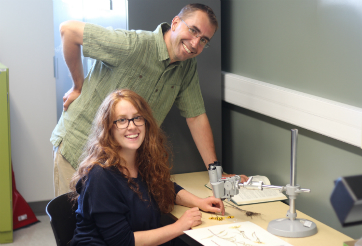The University of Winnipeg’s Department of Environmental Studies and Sciences celebrated its fifth Silver Ring award ceremony on April 22.
I could not possibly have been able to do this without everything I’ve learned through my degree and applying it in the real world through previous employments.
Mike McGarry
A bi-annual event, the ceremony highlighted students who graduated from the Forest Ecology and Forest Policy streams. Silver rings are granted by theCanadian Institute of Forestry-Institut Forestier du Canada (CIF/IFC)to acknowledge and welcome new graduates to the forestry profession.
According to the CIF-IFC: “The ring is a symbol associated with the completion of a CIF-IFC recognized forestry program. It is a clear sign that unites graduates in forestry at the national level, a bond that goes beyond differences in responsibilities, employment, province of residence, and language.”
Dr. Alan Diduck, Chair, Department of Environmental Studies and Sciences, says the two streams prepare students to jump into their chosen career paths after graduation.
“Having our Forest Ecology and Forest Policy and Management programs accredited by the Canadian Institute of Forestry is a feather in UWinnipeg’s cap and a big advantage for our students,” said Alan Diduck.
“It recognizes that our graduates have the knowledge and skills needed to work in sustainable forest management or related professions, and this puts them in a terrific position as they start or advance their careers.”
Meet two of this year’s graduates
Karla Sewell and Mike McGarry received their Silver Rings this year.
Sewell, who graduated from the Forest Ecology stream, started studying at UWinnipeg in 2015, just a few months after finishing high school.
然而,直到她研究的第三年during a day of tree planting when she discovered her passion for forestry.
“Tree planting made me think for the first time that I could really see myself doing this every day,” she said. “I loved the big trucks and quads and muddy logging roads, the remote living in tents and trailers, the vulnerability to the weather and climate, the wide-open space, the ease and openness you have with your coworkers when you’re alone in the forest, and just feeling calm and connected while being in the work place.”
当西维尔回到UWinnipeg秋天,她declared her major in Forest Ecology. Now, as she looks ahead, Sewell says she’ll slowly continue on her path towards a forestry career.
While she has tentative plans to do a master’s degree in the future under Dr. Ryan Bullock, Sewell recently enrolled in the Association of British Columbia Forest Professionals Allied Science Forester in Training program.
“This will allow me to train for two years to become a Registered Professional Forester in BC.”
For McGarry, his journey to graduation has been one filled with in-class learning and real-world experience. Starting his studies in the Forest Ecology stream in 2012, he has been a part-time student and professional the past 10 years.
“I decided it was as important to actively work in the industry as it was to study the industry,” he said. “While in school, I was forest fire fighting in Manitoba, managing helicopter access operations on Vancouver Island, starting a sawmill company, and working on First Nation forestry economic development in northern Manitoba.”
McGarry’s passion for nature started when he was young.
Initially, his interests were geared more towards wildlife and freshwater ecology, but as he learned more about forestry and began working forestry jobs, it immediately clicked as a newfound passion and something he wanted to do the rest of his life.
“What’s so cool about forestry is how many kinds of jobs there are. If you want to be in the forest every day or flying in helicopters, there’s a job for that. If you want to have a steady office job, there’s a job for that too,” he explained. “Personally, I like the bush jobs where I get to be outside all day and fly, boat, drive, or quad into the most remote parts of Canada.”
Going forward, McGarry will be continuing with his career.
“My career has shifted from employee to employer through my sawmill business which recycles Winnipeg trees that come down due to disease,” he said. “I could not possibly have been able to do this without everything I’ve learned through my degree and applying it in the real world through previous employments.
“This next chapter of my career will undoubtedly be challenging, but there is nothing more rewarding than turning your passions into your livelihood.”
Learn about UWinnipeg’s forestry streams
As part of the Bachelor of Science in Environmental Studies and Sciences, students pursuing forestry can choose two streams: Forest Ecology and Forest Policy and Management.
Forest Ecology is the study of forest ecology, biology, and sustainable forest management, and the role our forests play within the overall management of other natural resources. Forest Policy and Management is the study of forest ecology and biology, with a focus on the administrative and cultural practices and the role of stakeholders in forest policy and management.
History of the Silver Ring Program
The very first Silver Ring ceremony took place in 1953 at the University of British Columbia (UBC), organized by forestry and forestry engineering graduates. This practice became a tradition at UBC and was adopted by three other forestry schools in 1961 (University of New Brunswick, Université Laval, and University of Toronto).
The CIF-IFC was asked to assume responsibility for the program and it became a centennial project in 1967. Since then, all graduates with a recognized bachelor’s degree have received a silver ring. In 2002, the Institute was proud to welcome graduating students from technical forestry schools.


